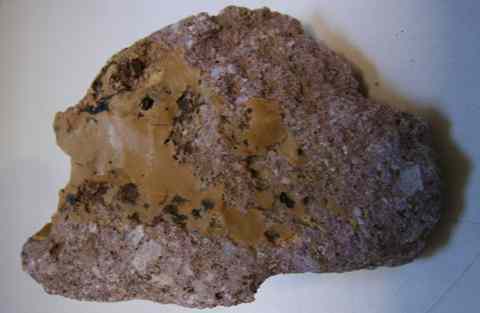Halloysite-10Å
Hoshimata, Tsumagoi city, Azuma county, Gunma pref., Japan

Field of view: 50 mm. Massive halloysite-10Å (Hydrohalloysite). The massive brown part is aggregate of fine halloysite-10Å crystals. The surrounding pink host is altered andesite. The rectangular white crystals in andesite are anorthite phenocrysts. The boundary between halloysite-10Å and andesite is not clear. The black part is dirt.
Recovered from a halloysite-10Å deposit in the andesite lava metasomated by acidic hydrothermal fluid.
Halloysite-10Å from this location was discovered in 1940.
It is considered that halloysite-10Å was formed by acidic alteration of anorthite as anorthite is selectively dissolved in some specimens. For example:
2CaAl2Si2O8 (Anorthite) + 2H2O + 4H+ = Al4Si4O10(OH)8 (Halloysite) + 2Ca2+
As this deposit locates near active volcanos, sulfuric acid can be supplied from them.